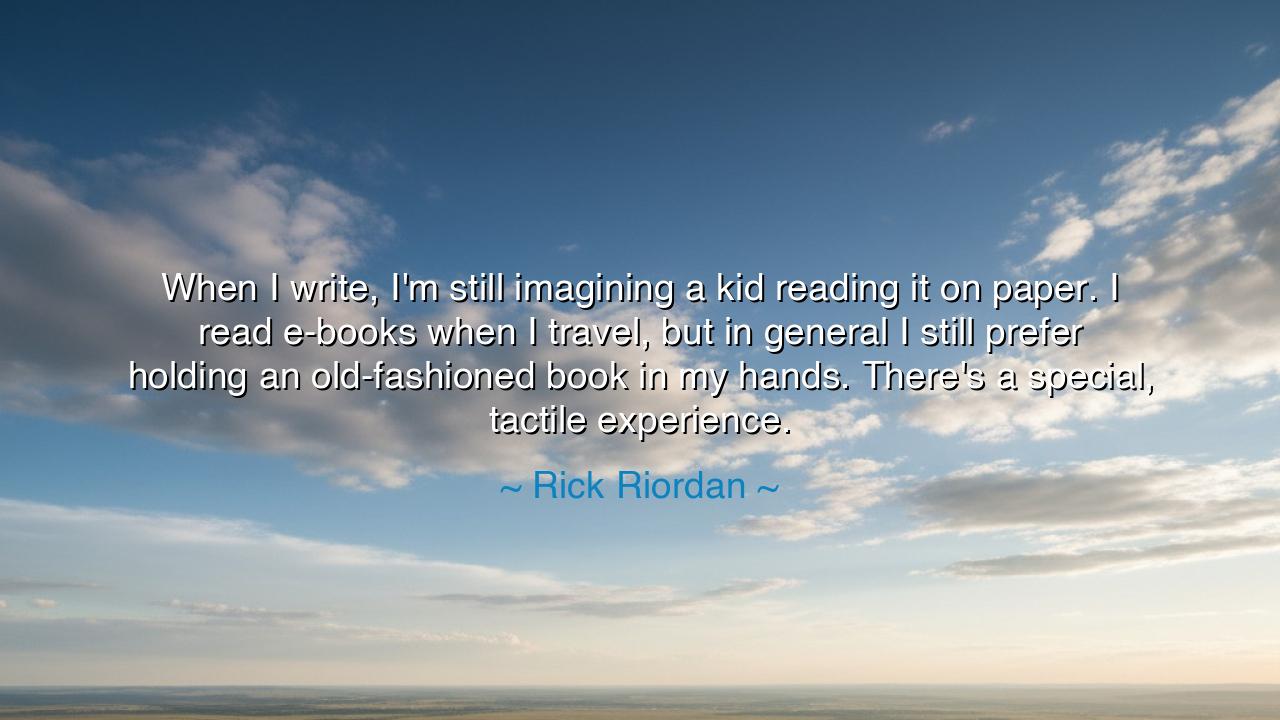
When I write, I'm still imagining a kid reading it on paper. I
When I write, I'm still imagining a kid reading it on paper. I read e-books when I travel, but in general I still prefer holding an old-fashioned book in my hands. There's a special, tactile experience.






Hear the words of Rick Riordan, teller of myths for the young, who said: “When I write, I’m still imagining a kid reading it on paper. I read e-books when I travel, but in general I still prefer holding an old-fashioned book in my hands. There’s a special, tactile experience.” At first, this may sound like a gentle preference, but within it lies a deep truth about the power of stories, the nature of memory, and the human bond to the written word. His voice is a reminder that books are not only vessels of knowledge, but sacred objects that connect the soul to imagination in ways no machine can wholly capture.
To imagine a child with a book is to imagine more than reading—it is to imagine wonder itself. The child does not merely scan ink on a page; he travels to other worlds, he meets gods and heroes, he learns courage and compassion. Riordan, who has given millions of young readers journeys through Olympus, Asgard, and beyond, still envisions the magic of paper, for in its weight, its scent, its turning of pages, there is an ancient ritual. A book is not only words—it is a tactile experience, an interaction between flesh and parchment that roots the imagination in reality even as it soars beyond it.
The origin of this preference reaches back to the dawn of writing itself. The ancients carved on clay tablets, etched on stone, and painted on papyrus and parchment. To hold such an object was to hold a piece of eternity. The codex, the ancestor of the modern book, was not merely efficient—it was revolutionary, allowing knowledge to be preserved and passed hand to hand. The touch of pages became as sacred as the words they carried. In Riordan’s affection for the book, we hear an echo of those ancient scribes who knew that the form of the word was as important as its spirit.
History gives us vivid testimony. Consider Thomas Jefferson, who built his personal library with such passion that when the Library of Congress was burned in 1814, it was Jefferson’s collection that became its rebirth. To Jefferson, the books themselves were treasures beyond gold, objects to be held, turned, lived with. Each volume carried not only ideas but the physical mark of hands, margins scrawled with thoughts, bindings worn with use. The old-fashioned book was not merely storage—it was memory itself, alive with human touch.
Riordan’s words also contain humility before the tools of the present. He admits the use of e-books when he travels, for convenience is a gift of modernity. Yet even so, he declares preference for the printed page. This balance is instructive: embrace technology when it serves you, but do not abandon the deeper experiences that root you in humanity. For the glowing screen may give you access to countless books, but it cannot offer the feel of paper, the smell of ink, the ritual of turning pages one by one.
The emotional truth of his statement is this: the tactile experience awakens memory. Think of the way one remembers not only the words of a beloved book but also its weight in the hand, the creases of its spine, the very page where a favorite passage resides. These physical anchors tie memory to the senses, deepening its hold on the soul. Without them, reading risks becoming fleeting, detached, consumed quickly and forgotten. A book, by its very nature, insists upon presence—it asks to be touched, held, cherished.
The lesson for us is clear: do not abandon the ancient practices in your rush for convenience. Embrace what is new, but honor what is old. If you love stories, then hold them in your hands, not only in your devices. Let your children and your children’s children feel the turning of a page, so that they may know reading not only as information, but as experience. For in the physical bond between reader and book lies a form of magic that technology cannot erase.
So let Riordan’s words be remembered: “I still prefer holding an old-fashioned book in my hands. There’s a special, tactile experience.” The book is not just a vessel of words—it is a companion, a relic, a bridge between ages. Honor it, and pass it on, for in doing so you preserve not just stories but the very way humans have touched knowledge for centuries. And in the quiet turning of each page, you will find that you are not simply reading—you are participating in the eternal ritual of wisdom.






AAdministratorAdministrator
Welcome, honored guests. Please leave a comment, we will respond soon